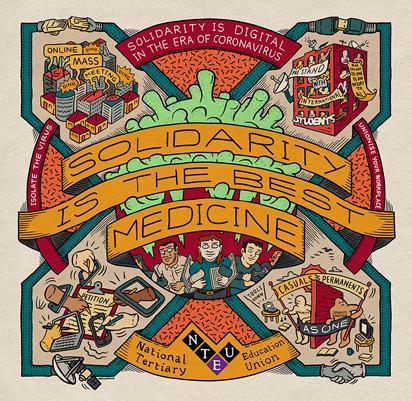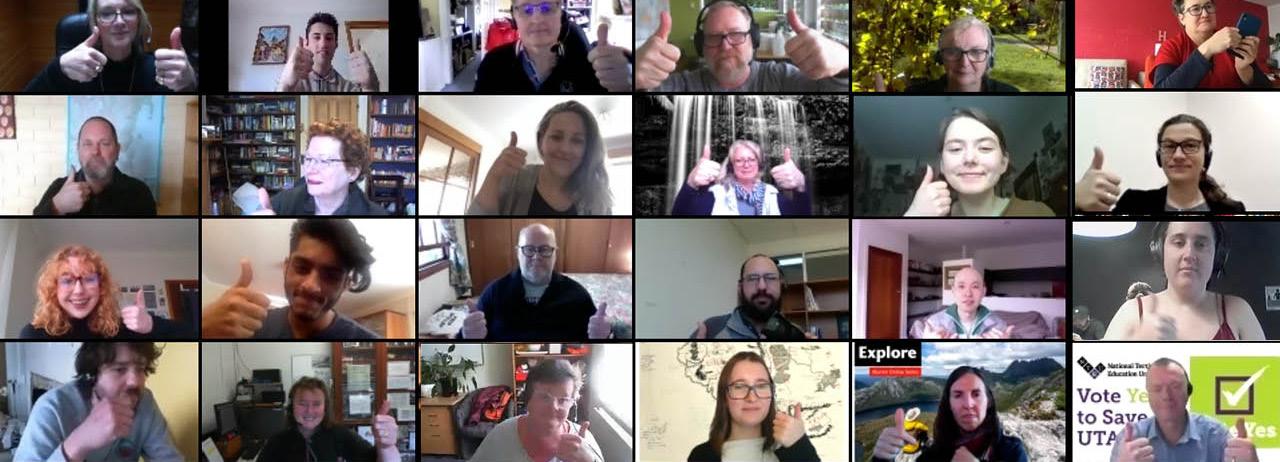
8 minute read
Matthew McGowan, General Secretary
from NTEU Annual Report 2019-2020
by NTEU

Matthew McGowan General Secretary
Advertisement

The past 12 months have been unlike anything experienced by our union, and deeply painful for our members and the sector. COVID-19 hit the higher education sector early and very hard, and the grim warnings about the impact of the loss of the international student market have played out as predicted. As hard hit as we have been by the global pandemic, the failure of the Federal Government to support higher education has almost been as devastating a blow. In facing into this challenge, the Union has found strength – inspired and led by our incredible members. NTEU members, delegates, elected officials and Branch committees have shown resilience and courage, and in their commitment to collectivism, they have supported each other and fought for the future of quality higher education. Our staff and members have worked closely together to navigate through the harm caused by the pandemic, and our union purpose and vision has revealed the lack of leadership in so many university managements. At this time of stress and pressure, we welcomed many new members into the Union, proving to all of us that we are stronger together, and that the role of unions is well understood in our community. The Union will emerge stronger and more resilient from this crisis, and we have proved our mettle, even as managements and government have failed us and the sector once again.
Impact on jobs and our sector. The loss of jobs in our sector is not only a result of the havoc caused by COVID-19. The lack of Federal Government support, and the decades of neglect of Australia’s higher education sector has compounded the damage done by the virus. The financial impact of the collapse in international income on the sector is dramatic with an estimated loss of between $3.5 billion and $4.2 billion.
The Union had warned of the risk of overreliance on international student income for over two decades. This reliance has been encouraged by successive governments who have relied on the income to drive increased domestic access without commensurate increases in government funding. Our teaching and research became hostage to government objectives to increase participation whilst decreasing per capita expenditure. It is cold comfort to those in the firing line to be proved right. It is the staff and students who will bear the cost of this folly. Government has not only failed to provide adequate support to the sector, it has compounded the harm to staff and students through the Jobs Ready Package.
The Jobs Protection Framework In this gloomy climate, the Union has stood strong, and acted early. When it became clear how dramatic the damage was going to be, the Union sought to negotiate a Jobs
Protection Framework with University managements. The national framework was negotiated with the ability to be adjusted to reflect the circumstances of different institutions. We sought to protect up to 10,000 jobs through collectively agreeing to cost saving measures in exchange for guarantees of financial transparency, management accountability, and limitations on how employers would act to reduce jobs. Through Universities Australia (UA) and the Australian Higher Education Industrial Association (AHEIA), university managements nominated four VCs to negotiate the framework with the NTEU national leadership. After weeks of intensive negotiations, a historic agreement was reached. While contentious, the package was endorsed by 80% of NTEU National Council members. With four senior VCs at the table, we had reason to believe we were negotiating in good faith. As we all know now, the universities reneged on their agreement and walked away from the framework. While those VCs who had signed the agreement remained committed, others worked to undermine it. There are many reasons for this, but responsibility for the collapse of the framework, and the consequential loss of thousands of jobs across the sector, must rest on the conscience of Chancellors and ViceChancellors across the country. I believe history will judge the current managements of our university sector very harshly. Despite university managements walking away from the Framework, the NTEU has negotiated agreements at universities that have accepted the transparency, accountability and limitations on actions sought by the Union. Variations to the agreement have been negotiated and implemented with NTEU consent at Monash, La Trobe, UWA, QUT, WSU, UTas, Wollongong and Adelaide. The NTEU has also won ballots against universities attempting unilateral unfair changes – at Melbourne, Curtin, Wollongong (leading to later negotiated outcomes), Southern Cross, Griffith, Curtin and Murdoch. Staff at ANU and JCU have approved variations to their agreements that were opposed by the Union. Eight joint agreements were concluded, seven unfair management proposals defeated, and two opposed variations proceeded. It is estimated that 1,500 jobs have been saved by Union negotiated variations so far.
Membership Through all this, NTEU membership has grown. We have seen an increase nationally of over 12% in the first 6 months of the year to our highest ever membership level. Around 40% of this growth came from casual members who responded to the offer of 3 months free membership offered at the start of the crisis. This initiative was both an offer to new members, but it also provided existing casual members relief from membership fees at this most perilous time. Sixty per cent of new members were from ongoing and contract staff who saw the Union as the only effective body working to protect their jobs. This assessment was confirmed in early results from the COVID-19 edition of the State of the Uni survey where 70% of NTEU members stated they were satisfied or very satisfied with Union efforts to protect jobs in the sector. Only 15% expressed dissatisfaction. (It is interesting to note that 55% on non-union members expressed satisfaction and 15% dissatisfaction, but only 5% were unaware of any actions). The challenge for the Union will come next financial year (2021/22) when the impact of job losses from across the sector flow through.
Union finances The Union is in a strong financial position, delivered by record membership and reduced expenditure forced by COVID-19 limitations and unfilled staff positions. Key features for the 2019/20 financial year are set out in the Finance Report on p. 33. Despite our strong financial position, the 2020/21 budget presents significant challenges as it is difficult to predict how expenditure patterns will be impacted by ongoing COVID-19 measures. While membership income will improve significantly as a result of increased membership in the 2019/20 financial year, the impact of job losses is expected to significantly impact on the 2021/22 financial year. The key highlights for the 2020/21 Budget are as follows: • Membership income to increase by about $429,000 or about 2.0% due to an increase in members, at least in the first part of the financial year. • Total salaries (including on costs) to increase by about $618,000. • Operating and discretionary spending to decrease largely due to limited travel as well as a decrease in meetings, conferences and other COVID-19 related items. • A budgeted surplus of about $335,000. NTEU will publish Audited Financial Statements later in calendar year 2020 in line with regulations within the Registers Organisations Act and International Accounting Standards.
The Pandemic, Elections and Rules Elections for Branches, for new National Councillors, and for most Division positions were due to be conducted in 2020. By law, the Australian Electoral Commission (AEC) conducts all union elections, and has suspended elections since March this year. Democracy is central to everything we do, so we are hoping that the election process will resume again as soon as practical but some phases of the elections will probably not be completed until early 2021. National Council, by electronic ballot, endorsed a change to the Union’s rules in May, in order to extend terms of office until new elections can be held, and to ensure continued proper operations during the pandemic. A further rule change is being presented to the Council to extend the special COVID-related election arrangements into 2021.
Debate makes our union strong. I recognise that the Jobs Protection Framework created debate, and the Union has been criticised by some. I have been in the Union for more 25 years as a member, delegate, Branch committee members, state and national official, and I have seen my share of heated and strong debates. And it was expected and very reasonable to have disagreement about something as significant as the Union’s response to the pandemic. These debates make our union strong. What does not make our union strong is abusive rhetoric, and the stoking of division when a position has been debated and lost. Only a small number of people have been aggressive and have attacked the Union, its officers and its staff. Our staff and Branch Officers do not deserve such treatment. They deserve our thanks and support, even when we disagree. Some of the people who disagreed with the Union’s position have established parallel organisations to undermine the position of the Union. NTEU is incredibly democratic and member driven. But democracy doesn’t mean getting your way, it means participating, debating, and at the end of that process – taking a position, sticking together and using our collective power. Finally, I would like to offer my deepest gratitude to our staff, officers and colleagues. Everyone has worked hard this year, and for some it has been the hardest year in memory. There are too many people to thank in the space available, but without the support of the National Executive, the staff of the Union, Division Secretaries and Branch Presidents, we could not have managed to get through this year. Many Branch and Division office holders will step down for personal or professional reasons, and other will leave as a consequence of the job losses ahead. To you all, thank you for your support. Thank you for the years you have put into representing and helping members, most often on your own time. Your effort has built a better union for all.
And to the National Officers, Alison Barnes (President) and Gabe Gooding (National Assistant Secretary), this year could not have been survived without your good humour, encouragement, expertise, and effort. But thank you mostly for your comradeship in the most difficult and trying of circumstances. We are all stronger together. ◆










